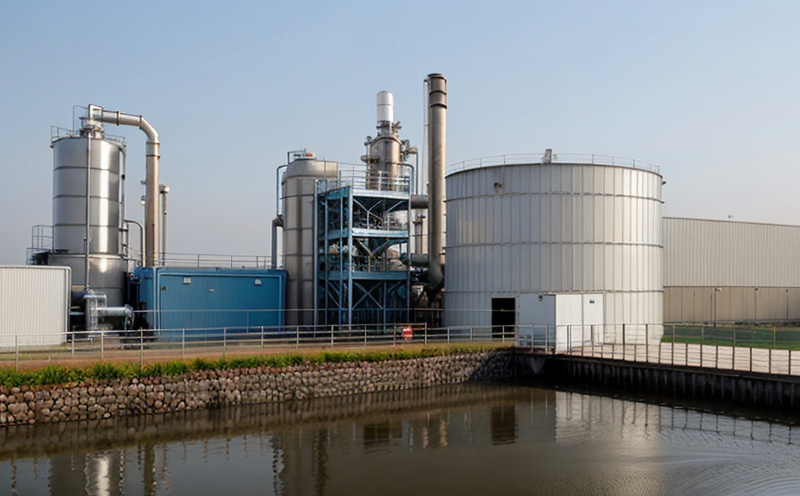EN 27888 Conductivity Testing of Industrial Water
The European Norm (EN) standard EN 27888 provides a comprehensive framework for conductivity testing in industrial water. This service is essential for ensuring the quality and purity of water used in various manufacturing processes, thereby maintaining product integrity and compliance with international standards.
Conductivity testing measures the ability of water to pass an electric current, which can be indicative of impurities present within the system. In industrial settings, this parameter plays a crucial role in ensuring that water meets specific quality thresholds required by production processes. For example, in semiconductor manufacturing, pure water is critical for cleaning and processing silicon wafers; any contamination could lead to defects affecting product performance.
Testing according to EN 27888 involves precise measurement techniques using conductivity meters equipped with appropriate electrodes calibrated per the standard's requirements. The process starts by collecting representative samples of industrial water from different points within the facility, ensuring that all relevant areas are covered. These samples then undergo rigorous analysis at our state-of-the-art laboratory facilities.
Our team employs advanced analytical instruments adhering strictly to EN 27888 guidelines to deliver accurate results every time. Compliance with this standard ensures not only adherence to regulatory requirements but also supports continuous improvement initiatives aimed at optimizing water usage efficiency across operations.
The importance of conducting conductivity tests cannot be overstated, especially when dealing with high-value products where even minor deviations could have significant impacts on both quality and cost. By leveraging our expertise in EN 27888 testing services, your organization can rest assured that its industrial water meets the highest standards set forth by industry best practices.
Moreover, regular monitoring through these tests helps identify potential issues early on, allowing for timely corrective actions before they escalate into costly disruptions. This proactive approach contributes significantly to maintaining consistent performance levels across all aspects of production activities supported by reliable supply chains.
In summary, our EN 27888 conductivity testing service offers more than just compliance; it provides valuable insights into the quality status of industrial water used in your facility. With this information at hand, you can make informed decisions about process optimization and resource management strategies that ultimately drive efficiency gains while minimizing risks associated with substandard inputs.
Benefits
- Ensures Compliance: By adhering to EN 27888, your organization demonstrates commitment to regulatory standards, thereby enhancing its reputation among stakeholders.
- Promotes Quality Assurance: Regular testing ensures consistent product quality by identifying and addressing potential issues early in the production cycle.
- Supports Continuous Improvement: Data obtained from these tests can be used to refine processes, leading to more efficient operations and reduced waste generation.
- Increases Operational Efficiency: Reliable data helps optimize resource allocation, reducing unnecessary costs associated with poor quality inputs or excessive consumption.
International Acceptance and Recognition
The EN 27888 standard enjoys widespread acceptance across Europe and beyond due to its robustness and applicability. Many global organizations recognize the value of this standard, making it a preferred choice for conducting conductivity tests in industrial water.
This international recognition extends to various sectors including pharmaceuticals, electronics manufacturing, food processing, chemical industries, oil refining, and more. Compliance with EN 27888 is often seen as an assurance that your facility adheres to best practices recognized worldwide.
The standard's adoption by major regulatory bodies such as ISO (International Organization for Standardization) further reinforces its credibility. Organizations seeking certification under these standards frequently incorporate EN 27888 into their quality management systems, ensuring consistency and reliability throughout the supply chain.
By embracing this widely accepted practice, your company not only meets current expectations but also positions itself favorably for future developments in environmental protection and sustainable practices.
Environmental and Sustainability Contributions
- Reduces Water Waste: Accurate conductivity testing helps identify inefficiencies early on, allowing for targeted interventions that minimize unnecessary water usage.
- Promotes Cleaner Operations: Identifying impurities in time allows for swift corrective measures, reducing the environmental impact of contaminated discharges into natural water bodies.
- Fosters Sustainable Practices: By focusing on efficient use and purification of industrial water, this service contributes positively towards sustainable development goals.
The continuous monitoring provided by our EN 27888 conductivity testing services ensures that your facility remains at the forefront of environmental stewardship. This proactive approach aligns with broader trends toward greener industries globally.





